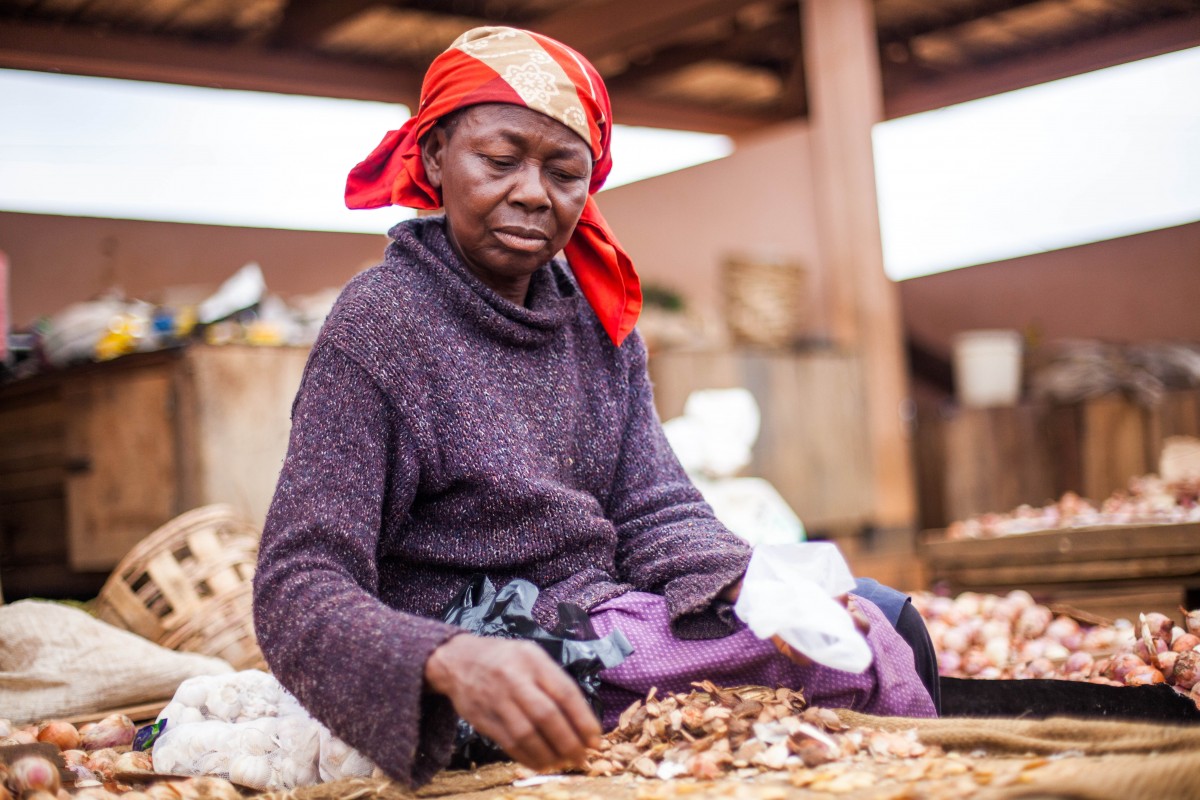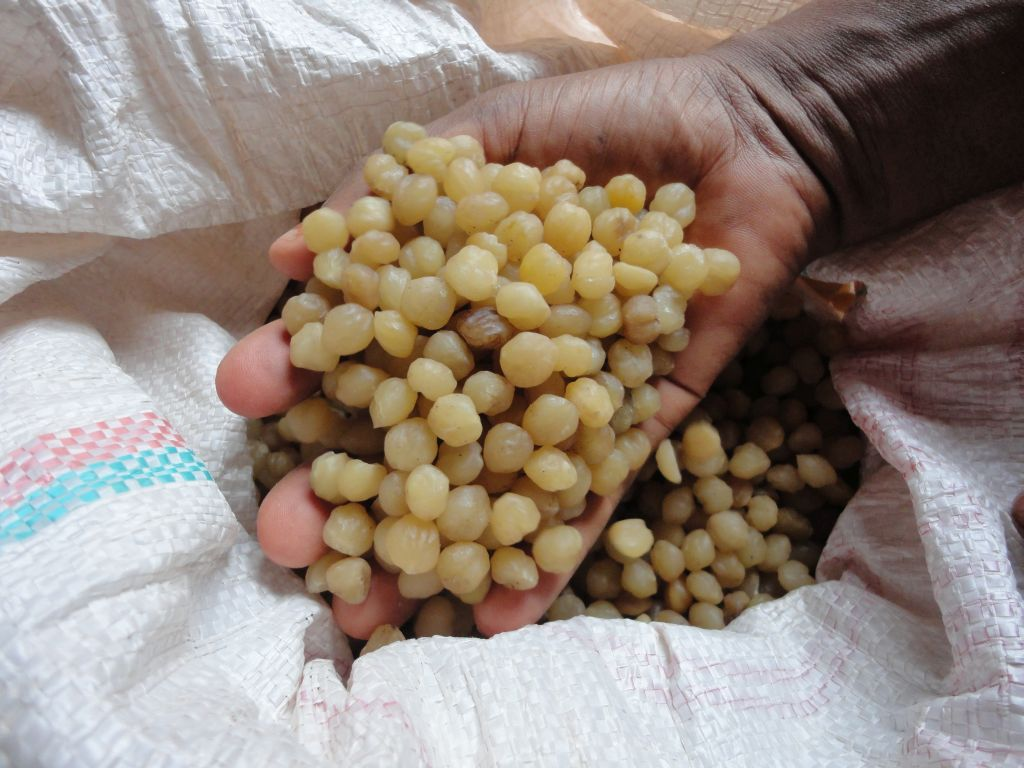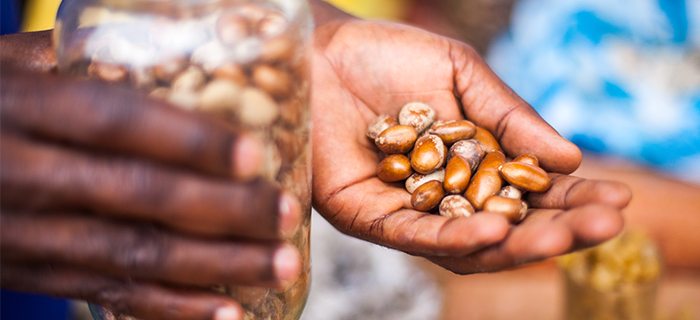By Marguerite Belobo Belibi and Judith van Eijnatten. Editing by Emma Boles.
“We collect fruits, seeds, and nuts from the forest floor, and we stock them in our homes to sell,” Élise tells us. “But we have hardly any buyers, so we earn nothing. Even if a buyer arrives, and he gives us five hundred francs, we can do nothing with that little money.”
Élise is one of thousands of women in the region around Bibimbo, Cameroon trying to make a living collecting fruits, seeds, and nuts. These “non-timber forest products” generate income that supports their families. But gathering NTFP like bush mango, njansang, koutou, ebaye, cola, talala and the mushroom Koutou is a poorly paid, labor-intensive and dangerous activity.

Setting out a small stock of dried bush mango for sale.
Wearing little protective clothing Élise hacks her way into the forest with a machete, carrying heavy head-loads of basic supplies for hours, often days. She may camp overnight, carrying out primary processing, such as the removal of fruit seeds, in the forest to reduce the weight to be carried back.
Élise knows she is taking the risk of accidental injury, attack from wild animals or losing her way every time she goes into the forest, but she depends on the income from what she can collect. Unfortunately, her earnings are constrained by Cameroon’s “Forest Law.” which requires expensive sales permits for non-timber forest products, permits which Élise cannot afford. She is dependent on travelling middlemen to buy her products and being eager to sell she falls prey to their unscrupulous tricks for weighing and low pricing. Nonetheless she will have little choice but to continue collecting and selling to middlemen.
The Forest law
Collecting NTFP’s for personal use is allowed under the 1994 Forest Law—legislation formalising land tenure and control over forest resources, whilst proclaiming state ownership of much of Cameroon’s forest resources. This law is at odds with traditional land-tenure principles of open access and common property. Community forests are now managed by committees dominated by men focused on timber harvesting, who consider NTFP harvesting to be for women, and of secondary importance. Whilst the law has fuelled economic growth through industrial timber exploitation, it greatly circumscribes the extent of forest territory that local communities can control and mandates expensive permits for the commercial sale of NTFP’s. This disproportionately discriminates against women, the principal collectors and processors of NTFP’s and favours only wealthy, educated traders—almost always men.

Walking into the forest to a women’s group collection meeting.
These regulations, the gendered division of responsibility and a focus on timber, has reduced women’s influence over revenues from community forest resources. Women have no say over money earned from timber harvesting, and are restricted to low return NTFP harvesting. Nonetheless, NTFP collection and sales remain an important income strategy for women to feed their families, and supplement household revenue for small essentials such as matches.
‘Buyum Sellum’
Under the 1994 Forestry Law, NTFP sellers must navigate dense bureaucracy to obtain a pricey sales permit. Wealthy educated traders buy out expensive licenses and hire middlemen— “buyum-sellum” —to visit villages and buy up NTFPs, at prices far below market rate.
These women collectors are powerless. They do not have the finances, influence or knowledge to obtain the permits needed to sell their NTFPs in urban centers, so they must choose between selling their products to middlemen, or transporting products without the proper paperwork; vulnerable to unscrupulous police, forest guards, and custom agents who may demand the payment of bribes.
As it is almost impossible for these predominantly poor women to operate within the law their only option is to sell to the ‘Buyum Sellum’. There is a lack of market transparency as a lack of information regarding supply locations, volumes and product quality further inhibits trade and disempowers these women.
Empowerment and Agency
SNV is changing this. By balancing the benefits of forest resources in favour of women, SNV is supporting collectors to overcome systemic market barriers, to earn a profitable return and to become empowered agents in the NTFP supply chain.
SNV trained women on improved collection and processing techniques, and educated them in responding to market demand, grading product quality, standardizing units of measurement and understanding the “purchase tricks” of middlemen. The training employed a “trickle-down” approach with a core of female group trainees transferring their new skills to the members of their local “collection groups.”
SNV organized women into local collection groups to minimize time-consuming labor-intensive collection and processing of NTFPs. Collection groups mean the women bulk their products for large stocks, which decreases dependency on middlemen and encourages the building of direct and fair commercial relationships with wholesalers. “In the past we used to collect on our own or with our children,” said Angèle Akoun of Kongo village, Lomié “After the training, we now work in groups to collect our Njansang or bush mango, and we produce much more.”
Scaling Women’s business
To promote collaboration at a higher level, collection group networks were established between villages, mostly made up of and led by women. These networks monitor stock and facilitate group sales. Across the network, a friendly spirit of competition often boosts the amount and quality of product collected.
To address systemic market barriers, SNV engaged the women’s groups with the Network of Community Forest Organizations to develop relationships with urban traders, to survey market prices, and support price negotiations and group sales. To organize collective sales, the networks and buyers reach a consensus on product, quantity, unit of measurement, price and date and place of sale. Streamlining prices and units of measurement across villages strengthens the women’s bargaining position and ensures all villages have equal market access.
At the end of the season, information from the collection groups is compiled to provide insight into sales volume and total income generated. This information allows the Women Community Group Networks and the Network of Community Forest Organizations to plan for the following season.
Technology for transparency
Accessing and coordinating market information is a challenge for women in remote forest communities. So SNV designed a market information system based on communications technologies accessible to both collectors and traders. Several towns have community radio stations which are widely listened to by NTFP collectors living in forest areas and the traders living in towns.
Information on volume and quality of products for sale, as well as contact details for sellers is passed by various collector networks to NTFP focal points, usually by mobile phone. Then it is compiled and transmitted to the radio station by Internet. Traders followed a similar procedure, transmitting information on market demand. Through this system women collectors and traders negotiate commercial deals, and the reliance on middlemen gradually decreases.
Fruits of the forest?
By implementing these key skills and strategies women collectors have improved their bargaining position, and their incomes from NTFP collection have increased dramatically. Previously incomes had been almost negligible, but during 2011 and 2012, collectors working with SNV earned an average income of €123 per collector - a very significant economic boost.
While this figure represents an important income increase, it masks significant income differences between genders. Women made up 91 percent of those supported by SNV. But the few male participants earned almost double what women made. Why? To start, male collectors are not encumbered by household tasks and have more time to spend in collection. They are also physically better equipped to extract the heavy loads from the forest. Men also used family labor - women and children - for cutting, drying and shelling, producing a larger volume of finished goods. In fact, as NTFP exploitation has become more lucrative, men are increasingly taking up “women’s work.”

Processed Njansang sells for a much higher market price.
However, there is no question that these new skills have empowered these women, resulting in greater agency and a sustainable platform for the continued growth of their NTFP businesses. At a household level, men generally support the activities of women and leave them in control of their earnings. Women prioritize investments they consider important, with a trickle-down effect benefitting their families. “With the money I earned I built my house and sent my children to school.” Lydie Adjele of Kongo village, says proudly.
“With the money I earned I built my house and sent my children to school.”
Many women typically spend their money on education, food, doctor’s’ visits, medicine, and home improvements, but women like Jeanette Bebave in Mboy village, Yokadouma are using it as capital for entrepreneurial investments. “I took the money and rented a cocoa plantation for 50,000 francs,” she said. “So I have now started my own cocoa plantation on one-and-a-half hectares.”
From Agency to Action
The increased incomes from sales have raised awareness of the potential value of NTFPs. Local government officials like Lomié mayor Célestin Assama Mbongo are figuring out new ways to support the development of the value chain. His village is buying machines that will make processing quicker and importing technology to extract oils from seeds like moabi and bush mango which can be sold in Europe.
“NTFPs are the hope of families of Lomié area,” he said. “We will use these partnerships so that our women, our population can earn more, right here in Lomié.”
Through earning and controlling their own income Lydie, Jeanette and many women like them are strengthening their position and voice within the NTFP value chain. These advances have occurred despite the restrictive provisions of 1994 Forest Law. But the course seems set in the right direction. A process for reforming the 1994 Forest Law is currently underway, with indications that it will enable local communities, particularly women, to benefit more from NTFP commercialisation.
Lydie Adjele reflects on how much things have now changed, for the better. “In the past we women had so many problems. A woman would always wait for her husband to give her money. It was the husband who did everything - bought the cooking pans, paid to send the children to school,” she said. Now, “we buy everything we need with our own money. We speak up, and we feel at ease because we earn our own money… because you know, it is money that provides everything in life!”
Marguerite Belobo Belibi
Marguerite Belobo Belibi is an international gender expert with a focus on community forestry and the development of non-timber forest product value chains. In this capacity she facilitates forest users to form grassroots and higher level organizations, to build technical and organizational capacities and access markets. Currently project manager of the SNV Cocoa-Eco Project in Cameroon, her work with cocoa farming communities supports cooperative development, market access and local capacities in REDD+ techniques. Maguy's work recently featured in “Global Trends in Land Tenure Reform: Gender Impacts” published by Routledge.




Very good work. Congratulations!!!!!!!